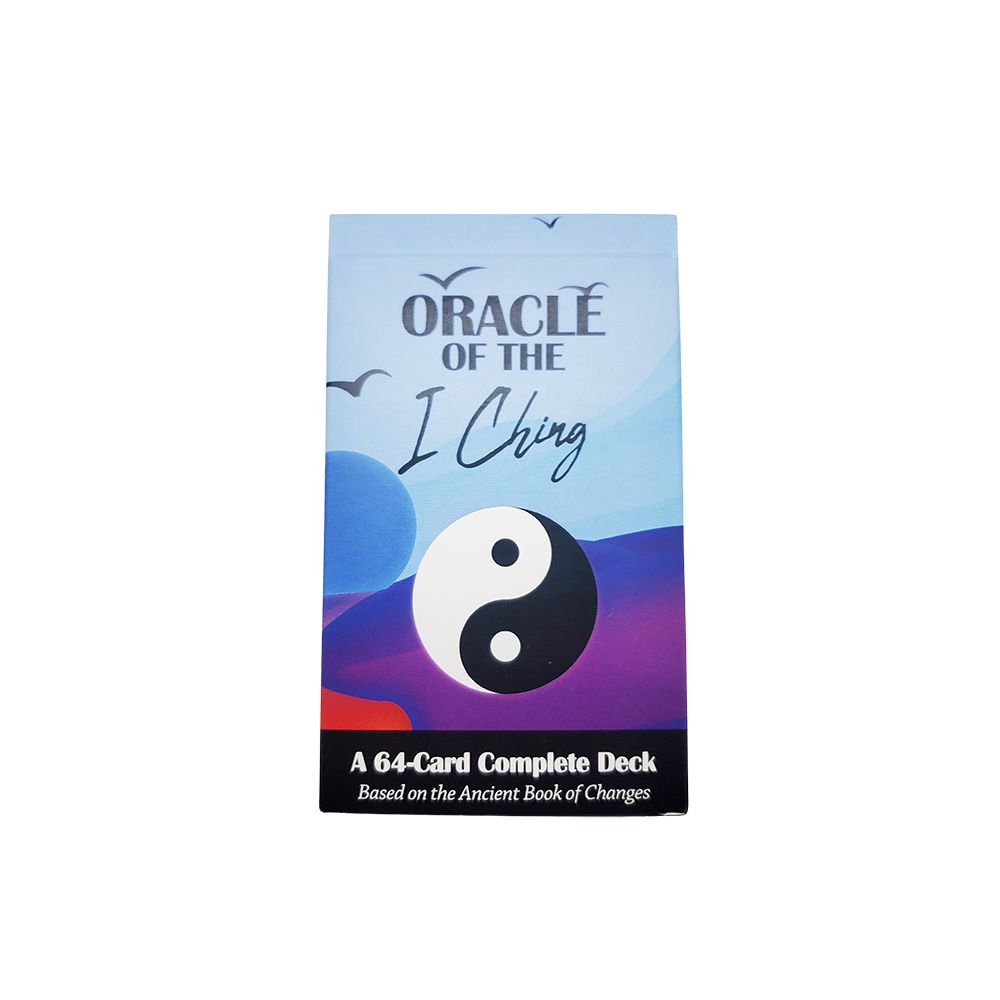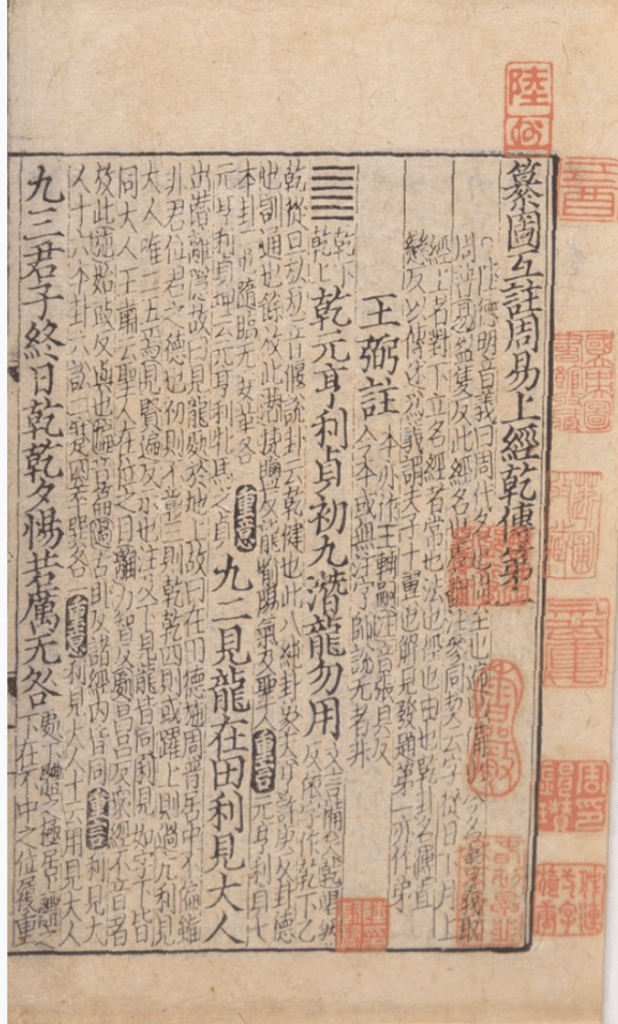Over 3,000 years of wisdom and guidance are now easy to explore and even easier to apply to your life with the help of the Almanac of Gaia and the I Ching Oracle Deck.
Now, you can consult the ancient Oracle of the I Ching without complex interpretations of yarrow stalks or coin tosses. This oracle anticipates change and recommends timely action in all the important areas of your life.

A simple two-card draw will clarify any situation and provide a path to success. While the I Ching Oracle Deck is used to clarify immediate and personal situations with a reading, the Almanac of Gaia is a forecast for the entire year. It is the guiding energy for each week.
This guide is a beginning for you. It provides a simple method to use the I Ching. It also provides a second, slightly more involved method that will require you to use a separate book or guide to the I Ching. We highly recommend The I Ching for Beginners by Mark McElroy. However, there are hundreds of different guides to choose from.
Background
The I Ching, also called the Book of Changes, is an ancient Chinese cleromancy divination tool. It has served both Eastern and Western civilizations over the centuries as a moral and spiritual guide. It is composed of 64 hexagrams that depict all of the situations of mankind.
The normal way of consulting the I Ching is to generate the hexagrams casting yarrow stalks or more recently coins. The caster has a particular question or concern in mind. The toss of the coins generates each of the 6 lines of a hexagram, each of which may be Yin, Yang, or a changing Yin or Yang line.
If the hexagram that is generated has one or more changing lines, changing those lines from Yang to Yin or Yin to Yang will generate a second hexagram. The first hexagram explains the issue. The changing lines explain the evolving situation in the future. The second hexagram offers guidance to deal with the situation.
The Oracle of the I Ching Deck offers a quick way to use the I Ching without the necessity of casting yarrow stalks or coins. The first and second hexagrams are generated by shuffling the cards and selecting one. That card is noted and returned to the deck. The deck is shuffled and a second card is drawn.
In this manner, it is possible that the same card is drawn twice. That essentially means that hexagram does not have any changing lines and it alone offers guidance on the question at hand.
Should a different card be drawn secondly it is placed aside and the first drawn card is retrieved from the deck.
Now you have either one or two cards.
The Simple Method
Examine the first card to understand the underlying issue affecting your question or concern. Then examine the second card to receive the guidance of the Oracle to deal with the issue.
The Second Method
In the second method, you can determine the changing lines to gain more insight. Compare the hexagrams in both cards. (if you drew the same card twice, there are no changing lines to guide you).
Looking at the hexagrams, examine each line. Those that are different between the two hexagrams on your cards are the "changing lines" from the first hexagram. Use any reference guide to understand their meanings.
In our simple method use the following table as a starting point. Be aware that there are hundreds of scholars and authors that have interpreted the hexagrams. There are many opinions and studies of the I Ching. You will find many viewpoints. You need to find one that fits your beliefs and spirit.
For ease of use, here are some basic interpretations to get you started.
| Hexagram Number and Name | Approaches to take | Actions to avoid |
| Hexagram 1 Taking Action | Move forward with purpose | Going it alone |
| Hexagram 2 Being Receptive | Take the advice of others | Being arrogant and impatient |
| Hexagram 3 Getting Started | Take time to prepare adequately | Going forward poorly prepared |
| Hexagram 4 Acting Rashly | Temper enthusiasm with restraint | Ignoring the lessons of others |
| Hexagram 5 Planning Action | Take time to train and practice | Not planning for contingencies |
| Hexagram 6 Resolving Conflict | Stand up for your beliefs | Acting against what you know is right |
| Hexagram 7 Rallying Others | Use gentle leadership | Engaging in conflict |
| Hexagram 8 Coming Together | Follow enlightened leadership | Avoiding your rightful place |
| Hexagram 9 Taking Small Steps | Wait for a better opportunity | Ignoring warning signs |
| Hexagram 10 Walking Softly | Use diplomacy and tact | Being emotional |
| Hexagram 11 Working Together | Be productive and generous | Being cheap or miserly |
| Hexagram 12 Falling Apart | Acknowledge your weaknesses | Practicing Situational Ethics |
| Hexagram 13 Getting Along | Be tolerant and broad-minded | Abandoning your plans |
| Hexagram 14 Having What it Takes | Have courage and guts | Being intimidated |
| Hexagram 15 Being Modest | Practice humility | Being conceited |
| Hexagram 16 Building Enthusiasm | Share your passion | Being manipulative |
| Hexagram 17 Adapting to the Times | Adjust your approach to the situation | Being dogmatic |
| Hexagram 18 Correcting Mistakes | Acknowledge mistakes | Justify wrong actions |
| Hexagram 19 Making Progress | Blaze a new trail | Wasting time |
| Hexagram 20 Inspecting Progress | Assess growth and progress | Insulating yourself from facts |
| Hexagram 21 Enforcing the Rules | Be fair and objective | Being biased |
| Hexagram 22 Seeing Beyond the Surface | Look beyond first impressions | Judging by appearances only |
| Hexagram 23 Tumbling Down | Be open to new ideas | Avoiding cutting your losses |
| Hexagram 24 Turning the Corner | Starting over with positivity | Being pessimistic |
| Hexagram 25 Living With Purpose | Maintain inner peace and directions | Disregard your instincts |
| Hexagram 26 Controlling Yourself | Be tenacious and dependable | Letting yourself go |
| Hexagram 27 Nurturing Yourself and Others | Become a mentor | Acting in a self-destructive manner |
| Hexagram 28 Shifting the Burden | Ask for help | Take everything on yourself |
| Hexagram 29 Responding to Challenges | Reinvent yourself or approach | Resisting change |
| Hexagram 30 Setting an Example | Do your best | Following the wrong persons |
| Hexagram 31 Taking Direction | Follow good advice of friends | Being swayed by others |
| Hexagram 32 Maintaining Progress | Adapt to ebbs and flows of life | Believing nothing changes |
| Hexagram 33 Stepping Back | Take time to reflect | Giving up |
| Hexagram 34 Restraining Impulsiveness | Proceed in a thoughtful fashion | Being irrational |
| Hexagram 35 Seizing the Moment | Make the most of the opportunity | Acting out of reflex alone |
| Hexagram 36 Surviving Dark Times | Handle the adversity with courage | Being swept up by evil |
| Hexagram 37 Establishing Order | Fulfill your rightful roles | Feeling you are above the law |
| Hexagram 38 Resolving Tension | Find common ground | Being antagonistic |
| Hexagram 39 Encountering Obstacles | Take a positive approach | Expecting an “easy way out” |
| Hexagram 40 Maintaining Effort | Be persistent | Quitting halfway through |
| Hexagram 41 Accepting Limits | Take time for yourself | Assuming you are invincible |
| Hexagram 42 Transcending Limits | Give more than is expected | Doing less than you are able |
| Hexagram 43 Pursuing the Best Course | Act in harmony with beliefs | Compromising your ethics |
| Hexagram 44 Resisting Weakness | Be of strong character | Slip into destructive habits |
| Hexagram 45 Building Community | Donate your time and talents | Isolating yourself |
| Hexagram 46 Pushing Upward | Work consistently | Taking a wait and see attitude |
| Hexagram 47 Dealing with Weariness | Stay optimistic | Pursuing hopeless situations |
| Hexagram 48 Tapping Potential | Do more than you even dream | Devoting time and energy to busy work |
| Hexagram 49 Transforming Yourself | Start a new enterprise | Balking at opportunity |
| Hexagram 50 Embracing Your Calling | Follow your dreams | Living without purpose |
| Hexagram 51 Handling a Crisis | Keep your wits about you | Giving in to fear |
| Hexagram 52 Being in the Moment | React, not respond to events | Get caught up in the chaos |
| Hexagram 53 Taking Things Slowly | Pace yourself | Rushing progress |
| Hexagram 54 Managing Relationships | Maintain friendships actively | Being selfish |
| Hexagram 55 Having It All | Take advantage of good fortune | Wasting opportunities |
| Hexagram 56 Crossing Unfamiliar Territory | Accept directions | Refusing the lessons of experience |
| Hexagram 57 Exerting Subtle Influence | Take a subtle approach | Trying to change others by force |
| Hexagram 58 Interacting with Others | Gain the inputs of others | Pushing others away |
| Hexagram 59 Achieving Unity | Act selflessly | Being prideful |
| Hexagram 60 Setting Limits | Be thrifty and prudent with resources | Going overboard |
| Hexagram 61 Influencing Others | See the viewpoints of others | Being deceptive |
| Hexagram 62 Dealing with Tradition | Honor the past with prudence | Ignoring rules and mores |
| Hexagram 63 Coasting Along | Have a purposeful direction | Ignoring your priorities |
| Hexagram 64 Reaching the Goal | Finish the job | Failing to honor commitments |





